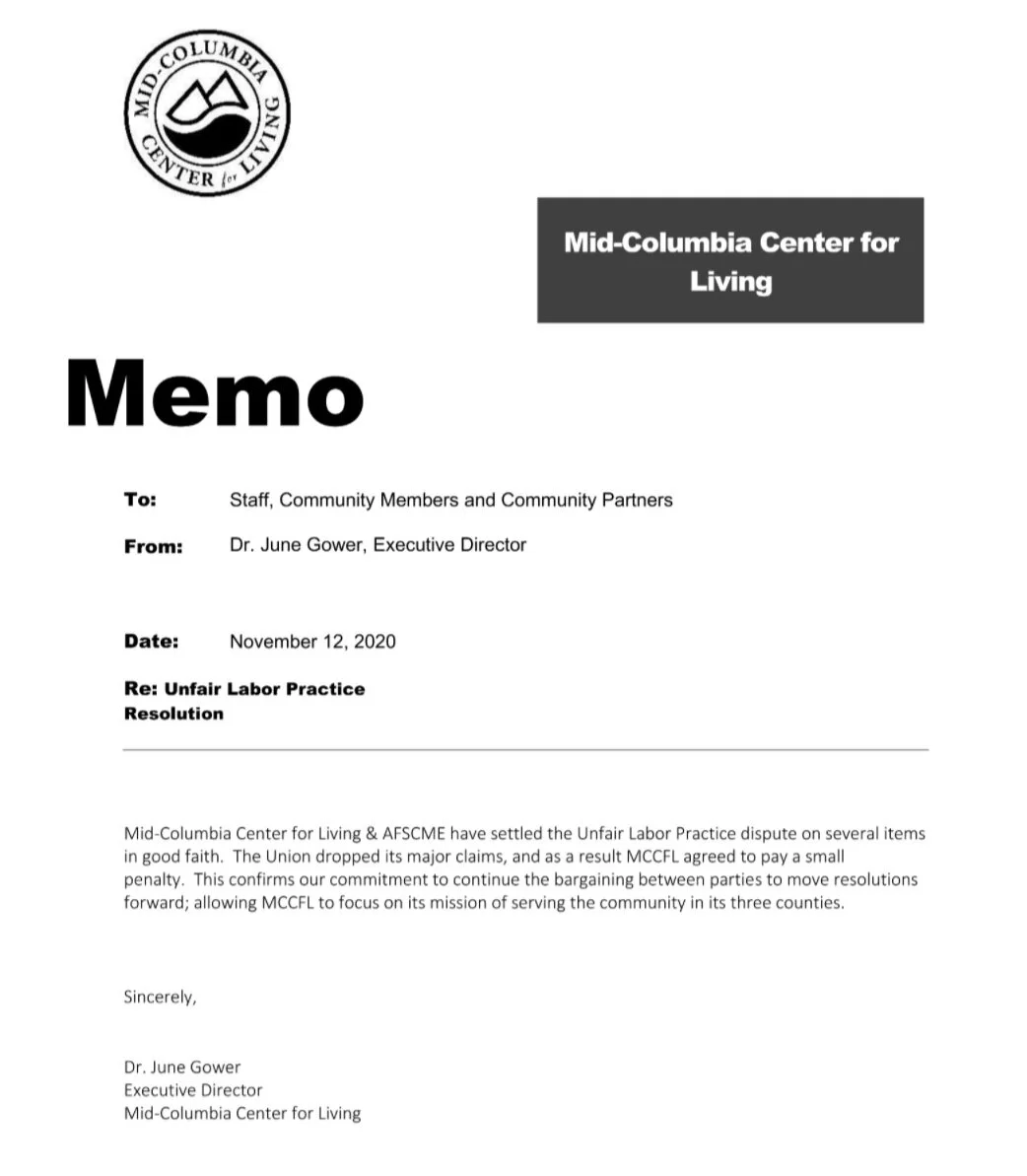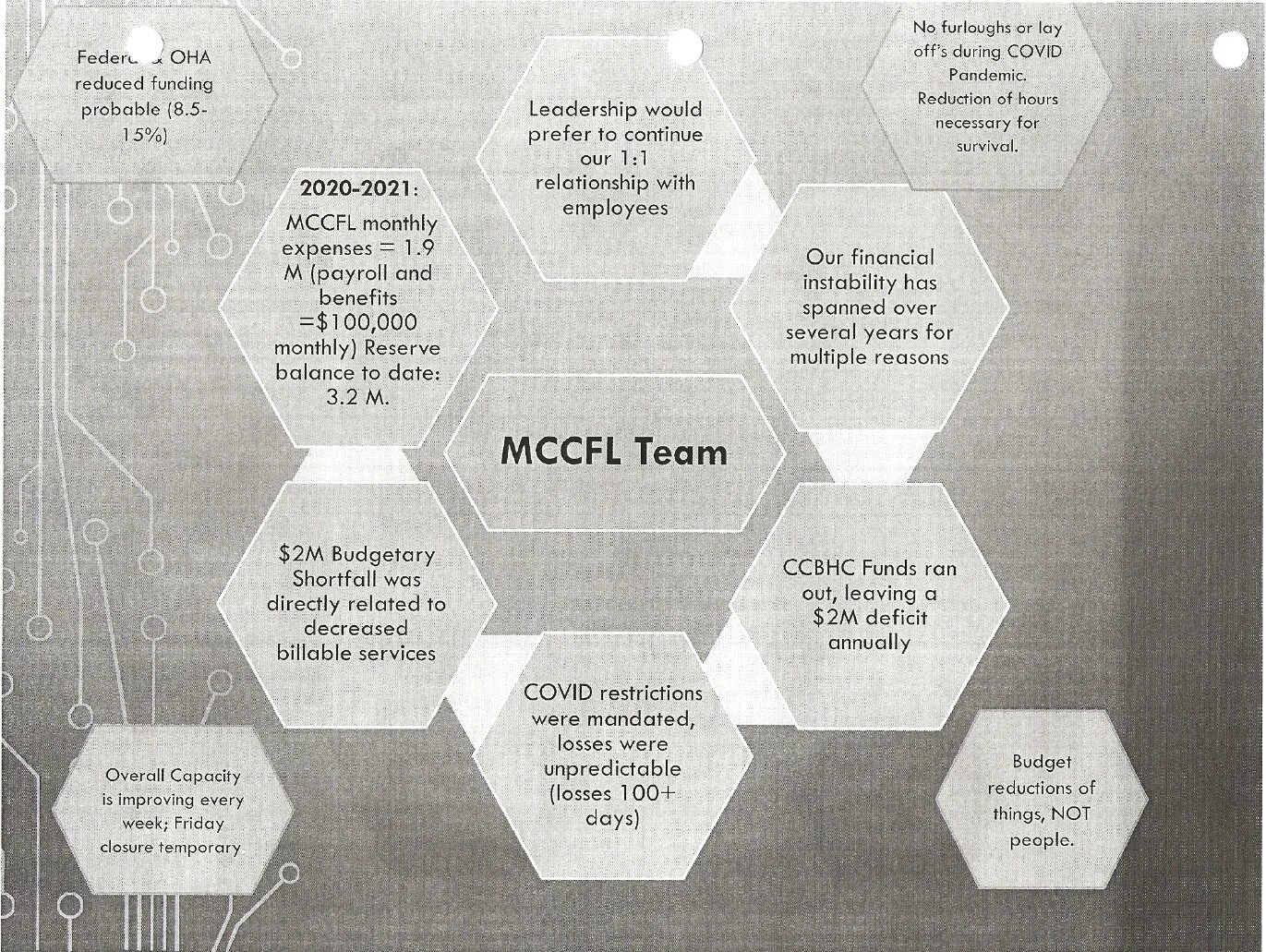Mid-Columbia Center for Living Settles Unfair Labor Practice Charges; Admits to violating the law, agrees to pay restitution
Mid Columbia Center for Living (MCCFL) Union Representative Dennis Ziemer released the following press announcement:
Mid-Columbia Center For Living Settles Unfair Labor Practice Charges; Admits to violating the law, agrees to pay restitution
After multiple unfair labor practice violations, Mid-Columbia Center for Living (MCCFL) has reached an agreement with Oregon AFSCME and the workers at MCCFL who are in the midst of bargaining their first contract after their union was certified in July.
MCCFL has violated the law according to a recent ruling by the Oregon Employee Relations Board (ERB). In opposing efforts to unionize, sending out the anti-union flyers using public funds and unilaterally modifying working conditions without notifying and bargaining with the union.
As part of the settlement, MCCFL will be paying some fines including attorney fees in the future, restoring the status quo on a few things—including rescinding the new employee manual and agreeing to not create any new provisional or so-called 'per diem’ jobs while in bargaining. MCCFL agrees to bargain over the impact on specific employees over the loss of the adults with intellectual or developmental disabilities program.
CCC News reached out to MCCFL Executive Director, June Gower for comment yesterday and received this statement late afternoon on November 12th, 2020.
Pictured: Memo Released on Thursday by June Gower, Executive Director of MCFFL.
A Chain of Events Leads to Bargaining and Resolution
CCC News previously reported that MCCFL has been experiencing financial difficulties in the past several years and needed to draw upon its reserves to continue to fund services. MCCFL Board of Directors identified that MCCFL would need a new budget starting July 1st, 2020. However, as management began making decisions about cutting hours in May, MCCFL employees raised concerns that they were not being realistic about the budget or fair to their employees. And on June 12th the MCCFL Union filed a petition to certify a new bargaining unit for the employees of MCCFL to the Oregon Employment Relations Board.
“In essence, there was a real concern on behalf of employees about the competency of leadership and management so they got together and managed to unionize in record time, just four days. It happened really fast because it was really that critical,” said Ziemer, MCCFL Union Representative
On June 16th, MCCFL managers and supervisors used $1,000 in public funds to distribute two flyers to MCCFL employees discouraging the formation of a union. According to the ERB orders, MCCFL supervisors “mistakenly believed that an election would be held and that it was lawful for it to convey its position on the election to the employees. The information distributed was intended to influence employees' decisions on whether to support the formation of a union.”
Pictured: Exhibits to Complaint 2. A flyer distributed by MCCFL management to employees. The information presented was meant to influence employees’ decisions on whether to support the formation of a union.
Pictured: Exhibits to Complaint 2. A flyer distributed by MCCFL management to employees. The information presented was meant to influence employees’ decisions on whether to support the formation of a union.
“It was rumored, and many employees believed, and this was in July, that June Gower was upset about the employees unionizing and was going to take a shot at them by trying to jettison the IDD program (Intellectual and Developmental Disabilities) program back to the state as a retaliatory act,” said Ziemer.
“Well sure enough in July they announced they were getting rid of the IDD program to save money, well, it was the only program that really had steady funding. I tried to explain to the board that if they were going to try and get rid of a program this wasn’t the one,” said Ziemer.
Email from Dennis Ziemer, Council Representative, presented as evidence to the ERB.
However In August, MCCFL management reported to CCC News that they were moving forward with the transfer of the IDD program back to the state. And on September 30th the program had gone. MCCFL did not provide advance notice to the union about the decision to hand the program back to the state nor did it properly bargain with the union over the impacts of eliminating the program, a direct violation of Oregon law. However, the ERB didn’t order the IDD program back to MCCFL in its orders, published yesterday. As the program and several of its employees have already gone to their new employer at Community Living Case Management, a non-profit with its own union, which now homes the program.
“MCCFL is required to negotiate with us about the separation for those employees, and give them a right to come back if there is a job that comes open that they are qualified for, those employees will receive the first right of refusal in the case that their positions reopen,” said Ziemer.
It’s been a tough but quick battle. The official hearing took place over just four days with the ruling being handed down yesterday.
“It’s going to end up costing the employer a lot more than if they had just listened. They refused to maintain the status quo. The employer isn’t supposed to go making changes that would usually take place during negotiations.” For example: When someone quit, they decided to split that position into two part-time non-benefit jobs. “They just made the changes and never responded to the union’s pleas to not make these changes without negotiations,” said Ziemer.
It’s been a quick battle and morale at the MCCFL union is doing well.
Pictured: MCCFL.
The hearing took place over four days but Ziemer says that things looked solid for their case starting at day one and that by day two it was clear that things would rule in the Union’s favor.
“These are public employees and there’s quite a lot of teeth in the labor law in Oregon. I think that the employees are feeling pretty good about having somebody to listen to them. They got their day at court. They wanted their employer to negotiate over working conditions and they got that.”
MCCFL will pay a $3,000 civil penalty for its misuse of public funds, offer to convert the nurse who was hired without benefits to a full-time position with benefitted status, cease converting positions to per diem or provisional status unless it bargains to completion with the union, notify the union at least two weeks prior to posting any vacancies, bargain over the impacts to those affected by the elimination of the IDD program and must cease and desist the unfair labor practices, which are laid out in ORS 243.672 (1)(i), (1)(a), and (1)(e) all of which pertain to an employer attempt to interfere with employees right to bargain and to create a union.
When asked about the process and whether he had any advice for other unions and employees looking to unionize Ziemer said, “It’s not easy, but you have a say, you’re no longer at-will employees when you unionize. Sticking together is the key to being successful. In this day and age when people are being laid off, you want to have the ability to negotiate how those things happen and how those things are performed, but you don’t have that right to it unless you form a union.”
“In addition to having a say in your work, you get to collectively bargain, to improve your work, your income, your ability to make a living. That helps everybody, it helps the community, it helps to spend power, it helps kids in school, it helps people maintain public services.”
“That’s all they wanted from the beginning was to be able to work together, because it became obvious nobody was going to work with them, the very nature of their work is based in community support,” said Ziemer.
Want to see more content like this?
Take our poll to tell us what kind of content you’d like to see more of.





